IAD Treasurer Hails Positive Results, Focuses on Efficiency to Better Support Mission
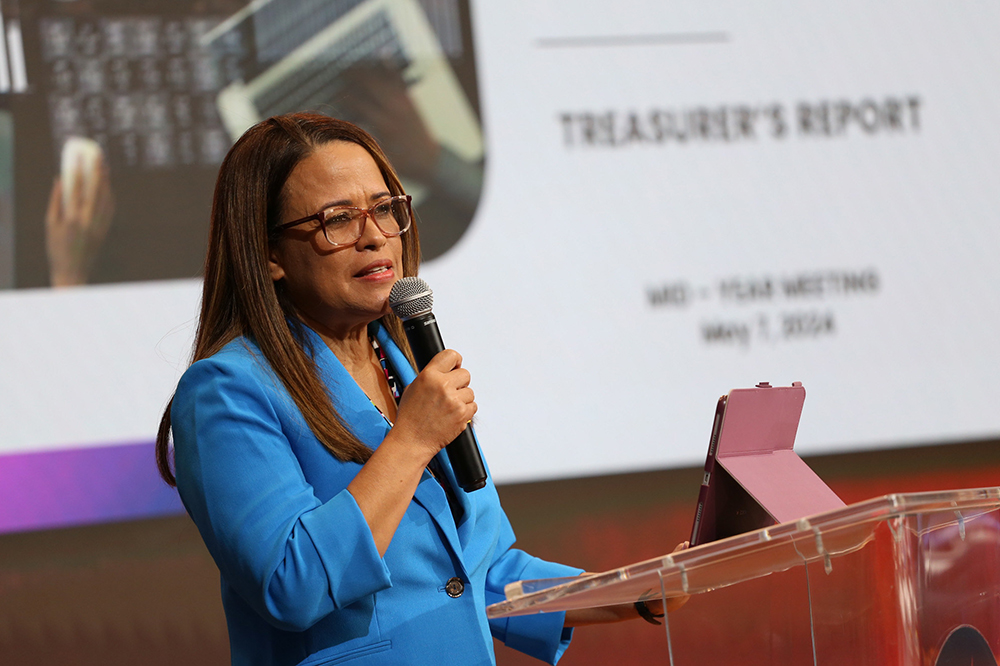
Inter-American Division Treasurer Ivelisse Herrera begins her financial report to Mid-year Executive Committee members stating that church finances are a responsibility, an opportunity, and a privilege during the second day of church business meetings in Miami, Florida, United States, May 7, 2024. [Photo: Libna Stevens/IAD]
May 10, 2024 | Miami, Florida, United States | Inter-American Division News
A responsibility. An opportunity. A privilege.
When tackling church finances, these are three approaches that can help every Adventist leader to understand not only the numbers but what’s behind them, said Ivelisse Herrera, treasurer of the Inter-American Division (IAD), in her report at the region’s mid-year meetings in Miami, Florida, United States, May 7, 2024. While providing a thorough report on the financial state of the Seventh-day Adventist Church in the IAD, Herrera’s presentation sought to distance itself from a regular report — “technically speaking, they are not very different from one year to the other,” she said — to “find meaning behind the numbers.” The goal is clear-cut: to help better fulfill the mission God has given His church, she emphasized.
Church Finances as a Responsibility
The IAD treasury team has “the responsibility of safeguarding resources that reach the coffers of our region, managing them prudently, within the relevant policies in force,” Herrera said. She also mentioned the responsibility of “making sure funds flow regularly throughout the various levels of church structure.”
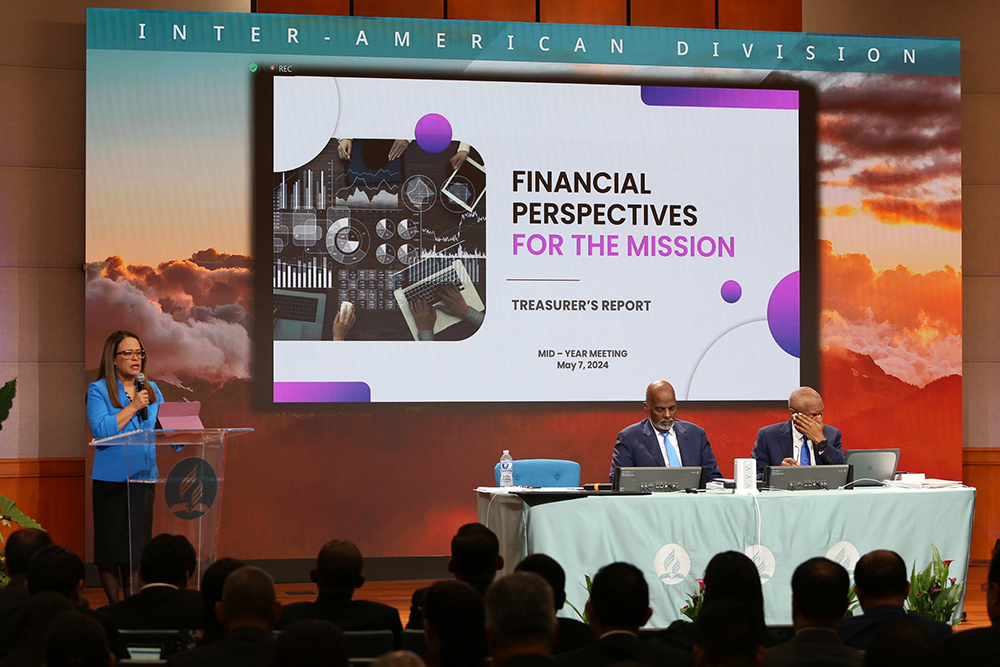
Ivelisse Herrera, treasurer of the IAD shares financial perspective for the mission in front of more than 160 executive committee members, on Ma. 7, 2024. [Photo: Libna Stevens/IAD]
It’s only against this background that Herrera shared some concrete figures, explain that “by God’s grace, the financial position of the division is strong, and we thank God for it” because “He is the one who gives financial growth.” She added, “The figures we can report to you today are simply the result of God’s blessings over His church in Inter-America.”
Substantial Increases and Stability
Herrera pointed out in this context that tithe income has experienced substantial increases, including a 37 percent increase in tithe in comparison with 2019. Offerings also grew 35 percent with respect to 2019.
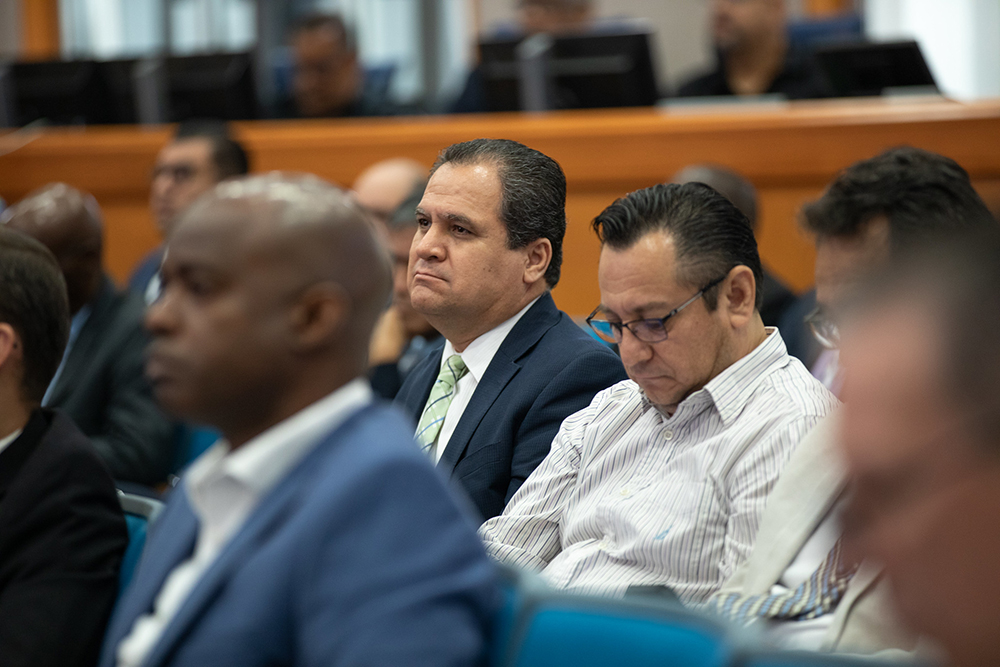
Committee members listen attentively to the IAD treasurer’s report on May 7, 2024. [Photo: Keila Trejo/IAD]
Regarding the net funds received to fund the IAD operations, programs, and initiatives, in 2023, the regional headquarters received a substantial increase of tithe funds as compared to a year before.
On the other hand, expenses have been kept consistently even, reported Herrera. Net appropriations received from the General Conference have been also consistent. Net assets have increased yearly in the current quinquennium.
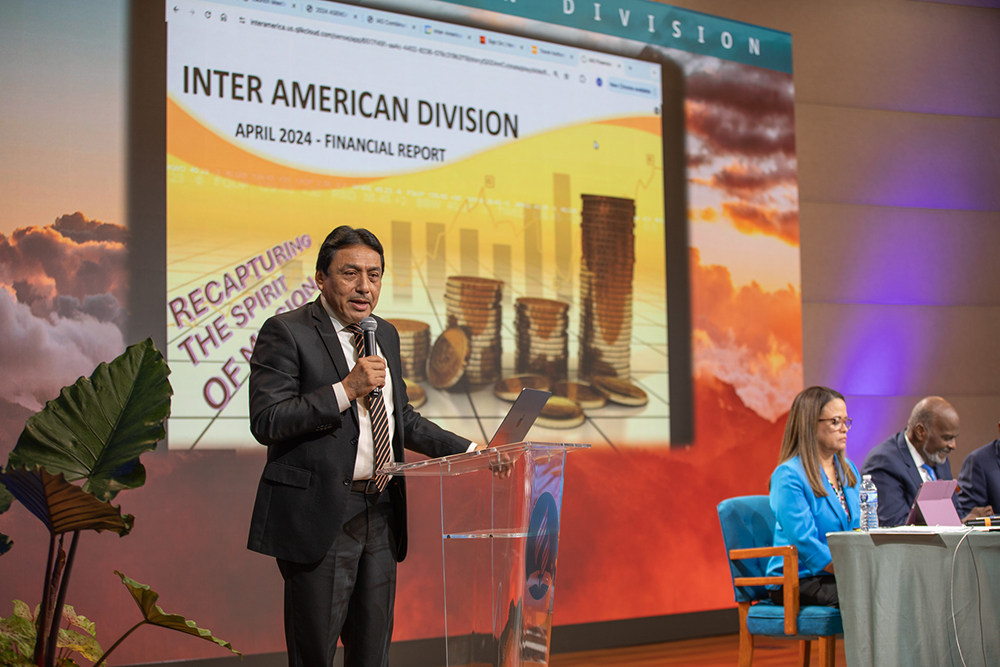
IAD Under Treasurer Abilio Cima begins the financial report for the year 2023 during the second day committee meetings. [Photo: Keila Trejo/IAD]
At the same time, Herrera reported, the IAD has sent the additional tithe to the General Conference according to policy, which is expected to nearly double by the end of 2024.
Expenses were always under the cap budgeted, she emphasized. In 2023, only 92 percent of the amounts budgeted were used.
At the same time, responsibility requires respecting the working capital (or, the difference between assets and liabilities) in months voted. While IAD policy requires 10 months of working capital, the church region closed 2023 with 23 months in working capital. Likewise, 6 months of liquidity (or, the ability to convert assets to cash to pay for short-term obligations) are required, but the IAD closed 2023 with 15 months in liquidity.

An executive committee members takes a photo during the financial report presentation. [Photo: Keila Trejo/IAD]
Church Finances as an Opportunity
Herrera returned to delve into the second approach included in her report. “We see church finances as an opportunity,” she said. “It is an opportunity to support the fulfillment of the church’s mission, of making disciples of Jesus around the world and not only within our territory.”
Quoting 2 Corinthians 8 — “that now at this time your abundance may supply their lack, that their abundance also may supply your lack—that there may be equality” (v. 14) — Herrera emphasized the communal nature of funds distribution. In this regard, she said, the IAD headquarters and its union conferences and missions have historically supported mission around the world through missionary offerings sent to the General Conference.
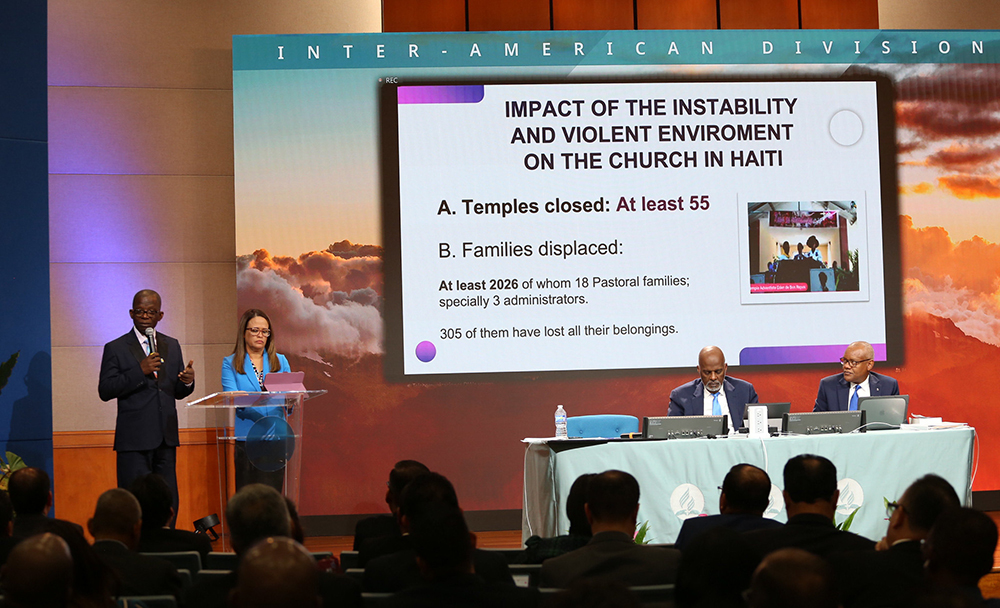
Pastor Pierre Caporal (left) president of the Haitian Union, shares the reality Seventh-day Adventists are experiencing in Haiti and their needs as well as the church operations. [Photo: Libna Stevens/IAD]
At the same time, Herrera reported, IAD appropriations to its territories, which fund regional church projects, initiatives, and activities, exceeded the ones from 2022. “Our support to our territories never stops, and it is our desire to do even more,” Herrera said.
Another opportunity is to support the IAD fields regarding the regional strategic planning, technology development, digital platform implementation, Hope Channel Inter-America, and software.
As part of the opportunity of assisting its territories in their needs, Herrera referenced an initiative of the regional church of showing solidarity with Haiti Seventh-day Adventists. “It is a great opportunity to cooperate with everyone, but especially with our faith family,” she said. She added, “There are moments when we must do more than what we usually do, and our dear spiritual family in Haiti is going through major challenges right now.”
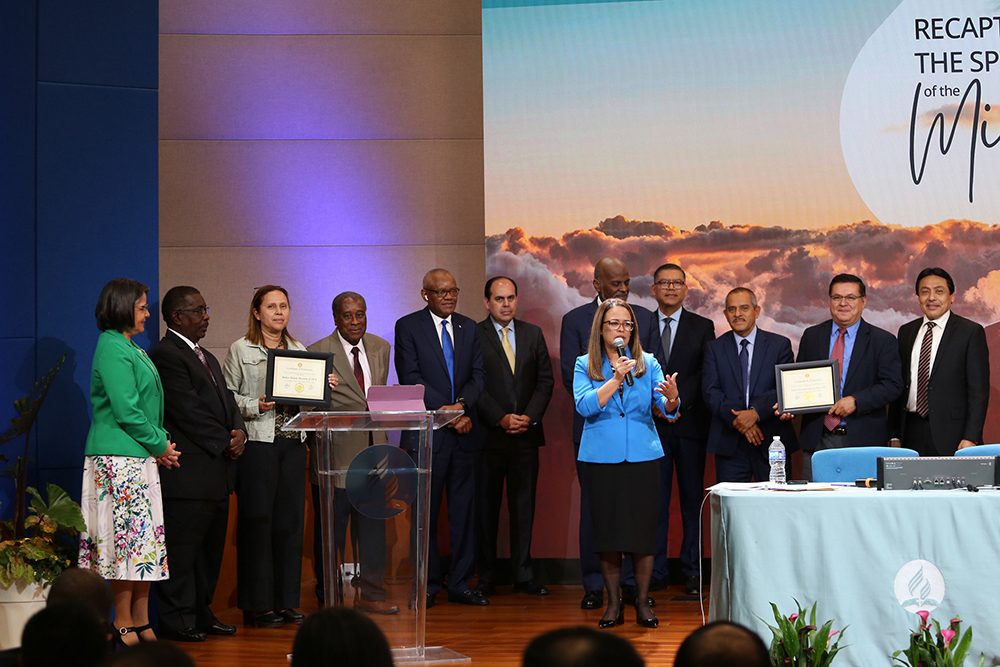
IAD Treasurer Ivelisse Herrera highlights the administrators of the Belize Union and the South Central American Union for completing a financial evaluation with high marks recently. [Photo: Libna Stevens/IAD]
Church Finances as a Privilege
“We see it as a privilege to walk together with our unions and with our local fields, helping them in every way we can so they can be more efficient,” said Herrera as she introduced the third and last approach to church finances. She referenced Hebrews 10, which calls us to “consider one another in order to stir up love and good works” (v. 24).
It’s all about encouraging each other so we can do an outstanding job for God’s glory, she said. At the same time, implies bearing one another’s burdens, she insisted, quoting Galatians 6:2.
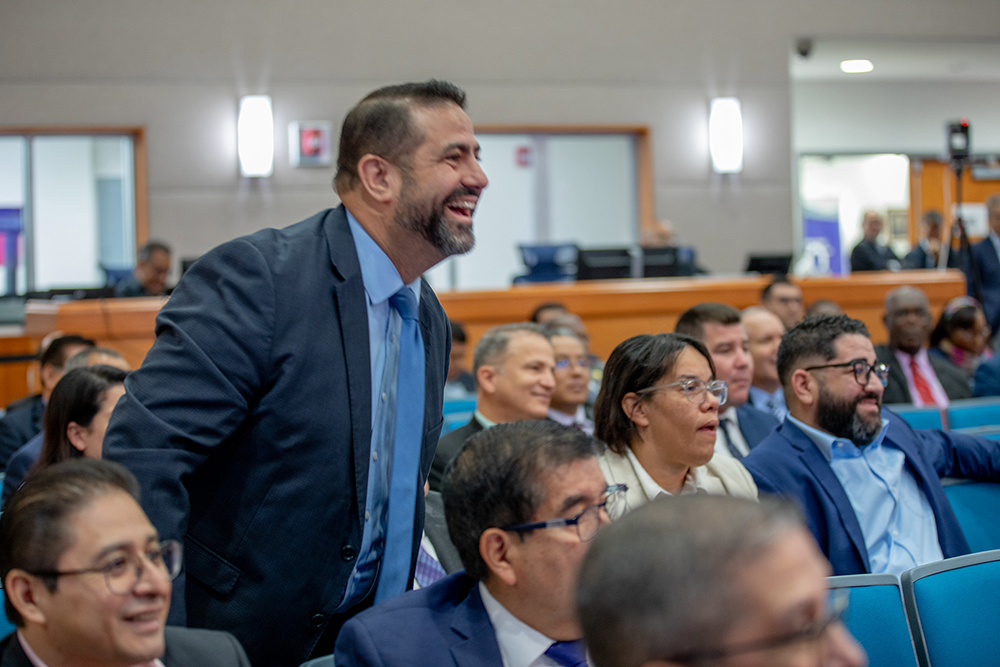
Pastor Luis Rivera, president of the Puerto Rican Union shares a laugh with IAD administrators during the afternoon committee meetings session, on May 7, 2024. [Photo: Keila Trejo/IAD]
Another way that, according to Herrera, is part of this walking together with the regional church fields is through councils for treasurers and stewardship directors, which help to encourage, update, and coordinate plans.
Saving to Increase Each Capital
Finally, she referenced a plan to encourage local fields, especially those facing some financial challenges, to develop a culture of savings to shore up their capital and reach the solvency requirements according to policy. IAD associate treasurer Juan José Morán explained what this initiative entails. The idea, Morán said, is joining efforts “with the purpose of generating funds that can be dedicated to the capital of each local field.”
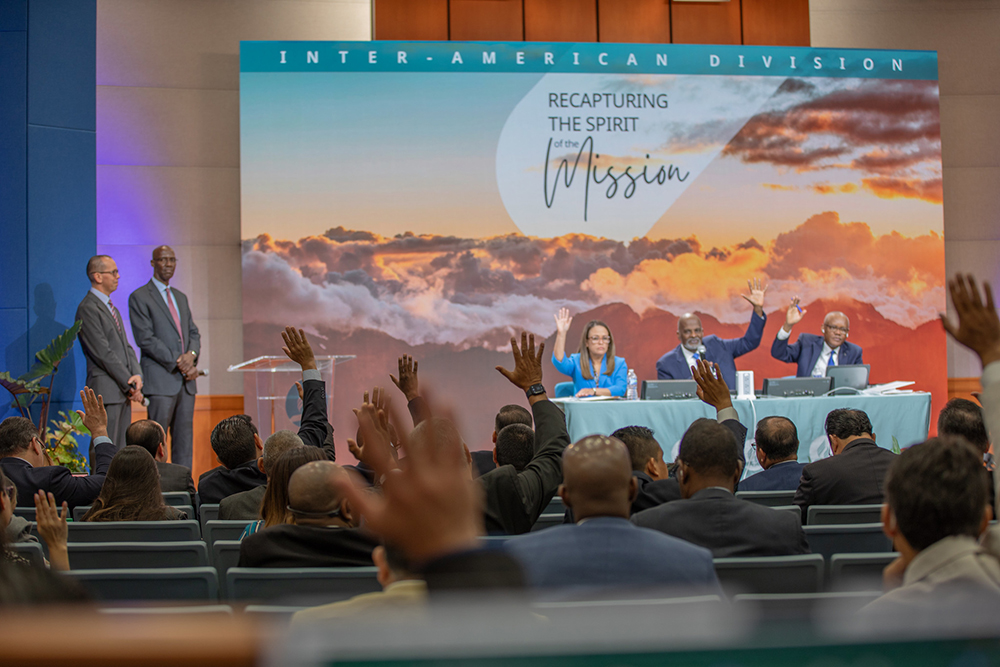
Executive committee members raise their hands in approval after being briefed from leaders of the auditing review committee members. [Photo: Keila Trejo/IAD]
More than a Technical Enterprise
Herrera concluded by noting the IAD Treasury “is an active, close, and vibrant ministry in its connection to fulfilling our mission.” She added, “We don’t see ourselves as mere financial technicians, as people who just say how much money is available or where the money is. We see ourselves as a group of men and women with a delicate and challenging responsibility, which is to secure, as far as humanly possible, that funds that God provides for His work be protected and invested in a right way.”
Feedback from Leaders
Several leaders walked to the microphone to react to Herrera’s report.
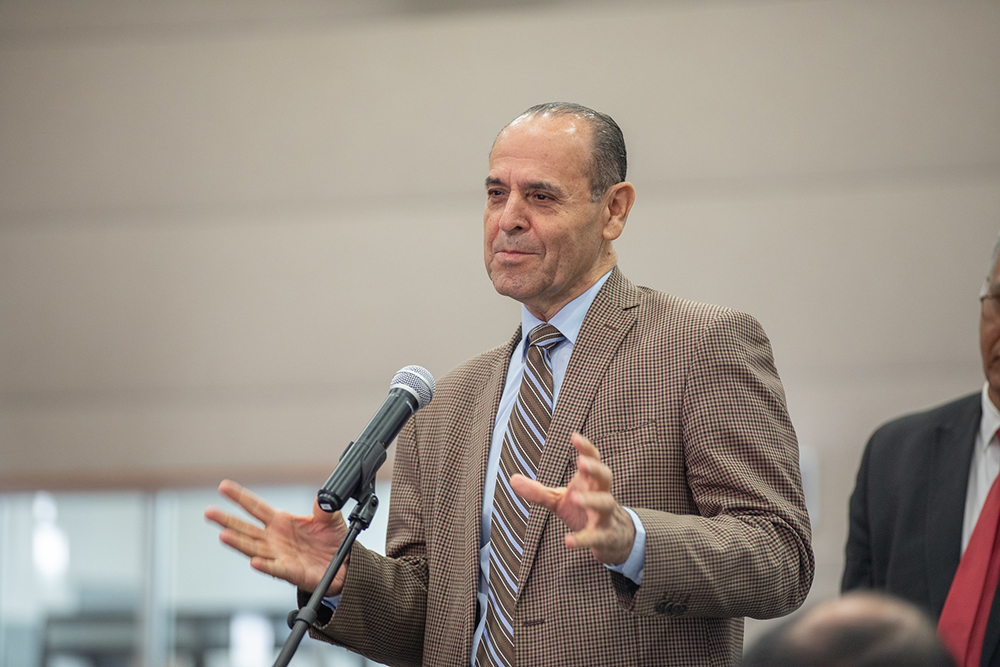
Dr. Ismael Castillo, president of Montemorelos University in northern Mexico, expresses his appreciation or the spiritual tone of the treasurer’s report. [Photo: Keila Trejo/IAD]
For Montemorelos University president Ismael Castillo, what stood out is the spiritual tone of the report. “It’s a challenge because numbers sometimes make us drift toward a business side… But I thank God for this report.”
Union presidents lined up to pledge to assist Haiti with special funds to help Adventists leaders and members who have been displaced and support their operations during political and economic challenges in the nation.
Jamaica Union Mission treasurer Ablai Blyde said the report was “balanced,” adding, “We give God thanks for the increases we have seen in tithes and offerings.”
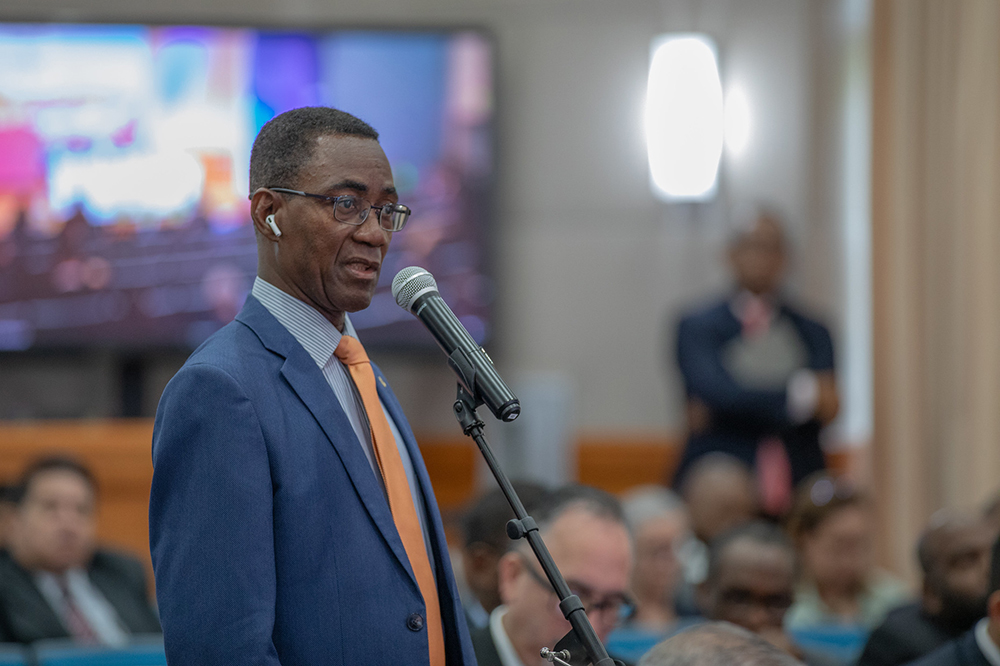
Pastor Peter Kerr, president of the Atlantic Caribbean Union, praises God for His blessings on the finances of the Inter-American Division as the financial reports concluded on May 7, 2024. [Photo: Keila Trejo/IAD]
Finally, Pierre Caporal, Haitian Union president, thanked everyone for their commitment to assist Seventh-day Adventists in Haiti. “I have witnessed the deep feelings of my colleagues toward us,” Caporal said. “On behalf of myself and our church members in Haiti, thank you.”